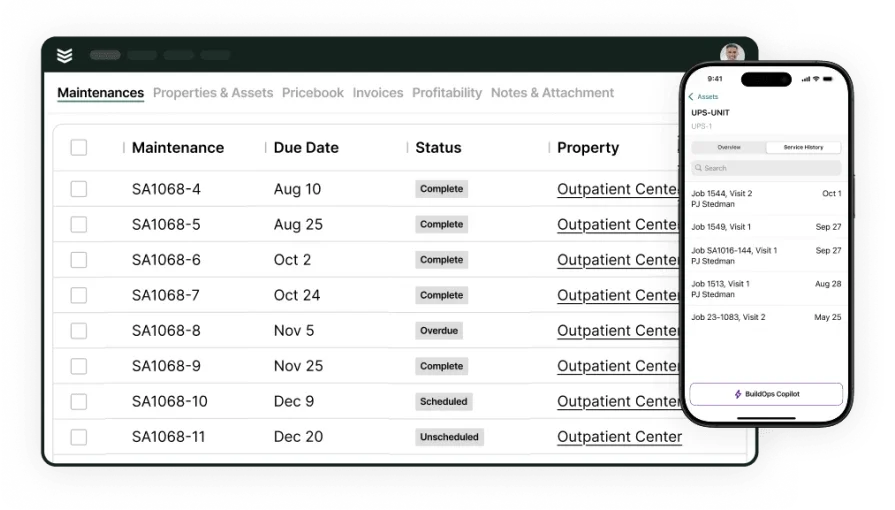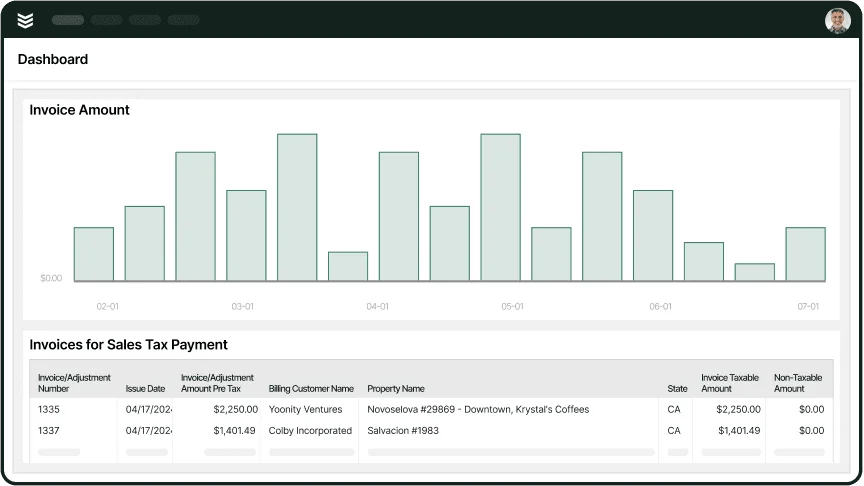Keeping jobs on track, crews organized, and customers happy isn’t easy. Cloud-based field service management (FSM) software helps by giving teams instant access to schedules, job details, and customer info—anywhere, anytime. No more lost paperwork or dispatch miscommunications.
Just a streamlined way to handle work orders, invoicing, and everything in between. Among many FSM solutions to choose from, cloud-based stands out for its flexibility. Unlike traditional systems, it works on any device and keeps operations running without expensive IT maintenance. This guide covers:
- How to choose a cloud-based field service management software
- 6 key features to look for in a cloud-based field service management software
- 6 best cloud-based FSM software
- 7 benefits of using a cloud-based field service management software
- 4 important FAQs about cloud-based FSM software
Whether you need better scheduling, real-time updates, or seamless integrations with the tools you already use, knowing what to look for is key. Let’s break down exactly how to choose the right cloud-based field service management software for your business.
How to choose a cloud-based field service management software
Choosing the right cloud-based field service management (FSM) software can make or break your workflow. The right system keeps schedules tight, teams connected, and jobs running smoothly—without the headaches of outdated systems or manual processes. But not all FSM software is built the same. Field service businesses need a solution that fits their unique needs, from scheduling and dispatching to invoicing and reporting.
Before making a decision, here are the key factors to consider:
- Scalability – Will this software grow with your business? Can it handle an expanding team and workload?
- Mobile access – Does it allow techs to update job details, access customer history, and receive real-time updates from the field?
- Integrations – Can it connect with your existing accounting, CRM, and inventory systems to avoid double data entry?
- Ease of use – Is it simple enough for your team to adopt quickly, or will it slow them down?
- Essential features – Does it include scheduling, dispatching, work order management, and reporting?
Having the right features is key, but what really sets cloud-based FSM software apart from other types? Let’s break it down.
What makes cloud-based FSM software unique from other types?
Not all FSM software works the same way. Some systems require in-house servers, while others rely on web access. But for field service businesses that need flexibility, cloud-based FSM software is the top choice. It keeps schedules, job details, and customer info accessible from anywhere—without the headache of IT maintenance.
Here’s how cloud-based FSM software compares to other types and why it’s the best fit for field teams.
- Cloud-based: Runs entirely online, meaning teams can access schedules, job details, and customer info from anywhere. Updates happen in real-time, keeping everyone on the same page without manual syncing or server maintenance.
- Web-based: Similar to cloud-based but may require a stable internet connection to function properly. Some web-based systems store limited data locally, but they don’t offer the same flexibility or automation.
- In-house: Installed on company servers, requiring dedicated IT maintenance. While it offers full control over data security, it lacks remote access and can be costly to update or scale.
- Hybrid: Combines elements of both cloud and in-house systems. Some data is stored on local servers, while certain functions sync to the cloud. This setup can work for businesses with strict security requirements but may still require manual updates.
Cloud-based FSM software stands out for its accessibility, automation, and ability to scale with your business. It eliminates the need for expensive IT infrastructure while giving field teams real-time access to everything they need. Now, let’s break down the key features to look for when choosing the right cloud-based FSM software.
AI-POWERED TOOLS ARE YOUR KEY TO SURVIVAL
Deep Dive
Adopting cloud-based tools is only half the battle. 80% of contractors we surveyed say using AI will be essential to staying competitive in the next 3 years. Instead of falling behind, learn what you need to do to get ahead now.
6 key features to look for in a cloud-based field service management software
Keeping jobs on schedule, teams connected, and paperwork organized is a challenge for any field service business. Cloud-based field service management software makes it easier by automating scheduling, invoicing, and job tracking—all in real-time. Here are six key features that make cloud-based FSM software essential for field service teams.
1. Smart scheduling & dispatch
Keeping schedules tight is critical in field service. Cloud-based scheduling software helps businesses assign the right techs to the right jobs based on skill, location, and availability. It also updates in real-time, so teams always have the latest info without needing to check in manually.
Take an HVAC company managing seasonal maintenance. When a tech finishes a job early, the dispatcher can instantly assign a nearby service call instead of wasting time with back-and-forth calls. The technician sees the new job on their phone, heads straight there, and maximizes billable hours.
2. Mobile access for technicians
Techs need access to work orders, customer history, and job details—without having to call the office. A cloud-based field service technician mobile app puts everything at their fingertips, so they can update job statuses, capture photos, and collect customer signatures in real time.
Picture an electrical contractor troubleshooting a complex wiring issue. With instant mobile access, they pull up past service history, reference blueprints, and update notes from the field—all without stepping away from the job site.
3. Seamless invoicing & payments
Chasing down payments is a hassle. With cloud-based invoicing software, techs can generate and send invoices before leaving the job site. Paired with integrated payment solutions, customers can pay on the spot, cutting down on delays and unpaid bills.
For instance, a refrigeration repair tech finishes a service call at a restaurant. Instead of waiting weeks for payment, they generate an invoice immediately, the customer pays online, and everything syncs to accounting—all in minutes.
4. Service agreements & preventative maintenance
For businesses managing recurring maintenance contracts, cloud-based service agreements automate scheduling and tracking. This keeps customers covered and ensures no contract work slips through the cracks.
Think of an HVAC contractor with hundreds of preventative maintenance contracts who can’t afford to miss service dates. With automated reminders and recurring scheduling, their team stays ahead of commitments, reducing last-minute calls and equipment failures.
5. GPS fleet tracking & route optimization
Fleet efficiency is key for service businesses. Cloud-based fleet management tools helps dispatchers monitor vehicle locations, optimize routes, and reduce fuel costs by avoiding unnecessary detours.
For example, a plumbing company responding to emergency calls needs their closest available tech on-site fast. With GPS tracking, dispatchers reroute the nearest crew, cutting response time and improving customer satisfaction.
6. Real-time reporting & analytics
Making smart business decisions starts with data. Cloud-based field service reporting tools track job completion rates, technician performance, and revenue trends—giving business owners the insights they need to improve efficiency.
Just imagine a mechanical contractor reviewing monthly performance notices certain jobs are running over budget. With automated reports, they pinpoint the issue, adjust scheduling, and reduce overtime costs moving forward.

Explore our service management suite
Equip your crews with field service tools that speed up job timelines.
Other notable features to have in a cloud-based FSM software
Not every feature is essential, but the right tools can make daily operations smoother and more efficient. Cloud-based field service management software offers automation, organization, and real-time insights that help businesses stay ahead.
- Automated quoting & proposals - Winning jobs starts with fast, accurate estimates. Cloud-based quoting software helps contractors build professional proposals with pre-loaded pricing, templates, and automated calculations—so teams can send estimates on-site instead of going back to the office. Take a general contractor bidding on a commercial project. Instead of manually crunching numbers, they generate an estimate instantly, review it with the client, and send it for approval—securing the job before competitors even respond.
- Pipeline & job tracking - Keeping track of leads, contracts, and ongoing jobs is easier with a cloud-based pipeline management tool. Teams can see which jobs are pending, in progress, or completed, ensuring that no opportunity slips through the cracks. Imagine a mechanical service company juggling multiple high-value projects. With an organized pipeline, managers can quickly assess project status, assign resources, and follow up on pending contracts—all from a single dashboard.
- Time tracking & payroll integration - Tracking hours accurately is a challenge when techs are always on the move. Cloud-based time tracking software eliminates guesswork by allowing crews to clock in and out directly from their mobile devices, syncing everything with payroll for seamless processing. Consider a plumbing company handling emergency repairs. Instead of relying on handwritten timesheets, techs log hours through the app, ensuring payroll is processed automatically—saving admin time and reducing errors.
These features aren’t just nice to have—they give service businesses an edge by reducing manual work, improving accuracy, and keeping teams organized.
6 best cloud-based field service management software options
Finding the right cloud-based field service management software depends on your business needs. Some platforms specialize in residential services, while others cater to large commercial operations. Below are six of the best options, each offering unique features to help field service businesses run more efficiently.
1. Best for commercial contractors: BuildOps
BuildOps is built specifically for commercial contractors, offering an all-in-one cloud-based field service management solution. From scheduling and dispatching to invoicing and reporting, it streamlines daily operations while keeping everything accessible in real time. What sets BuildOps apart is its deep focus on the needs of commercial service businesses, ensuring teams can manage multi-location clients, handle complex job workflows, and track technician performance with ease.
How Pricing Works: BuildOps offers live demos weekly, and you can request one whenever it suits you best. This will enable you to explore the features and choose the best solution to meet your requirements.
Why Cloud-Based is Better: Commercial contractors need real-time visibility across multiple job sites, seamless communication between teams, and instant access to customer history. A cloud-based FSM software eliminates the need for manual updates and ensures every department—dispatch, techs, and back office—stays connected.
What Sets it Apart for Commercial: BuildOps is designed with commercial service teams in mind. It offers advanced scheduling tools, automated reporting, and a mobile-friendly platform that helps businesses handle large-scale projects effortlessly.
2. Best cloud-based FSM software for residential contractors: Housecall Pro
Image Source: Housecall Pro
Housecall Pro is a popular cloud-based FSM software designed for residential service businesses. It simplifies scheduling, customer management, invoicing, and payments—all in a mobile-friendly platform. Many small to mid-sized residential contractors choose Housecall Pro for its ease of use and built-in marketing automation tools. However, it lacks the advanced reporting, asset tracking, and service contract management features that larger commercial businesses require.
How Pricing Works: Housecall Pro offers a tiered pricing model, starting at a basic plan for smaller businesses and scaling up with more advanced features.
Why Cloud-Based is Better: Residential contractors often juggle high-volume service calls, customer follow-ups, and last-minute schedule changes. A cloud-based system keeps everything in sync, so teams can adjust schedules, send invoices, and track payments from anywhere.
What Sets it Apart for Residential: Housecall Pro is great for solo contractors and small teams that need an all-in-one system with automated reminders, online booking, and customer communication tools.
3. Best cloud-based FSM software for general contractors: Jobber
Image Source: Jobber
Jobber is a well-rounded cloud-based FSM software designed for general contractors handling home service projects. It offers tools for job tracking, invoicing, and client management, making it a strong choice for businesses that need to stay organized without a steep learning curve. Albeit, it lacks the enterprise-level workflow automation and deep integrations needed for high-volume commercial operations.
How Pricing Works: Jobber’s pricing starts at an entry-level plan for small teams and scales up with more automation and reporting features.
Why Cloud-Based is Better: General contractors often manage multiple jobs at once, requiring an easy way to schedule crews, track work progress, and handle payments. A cloud-based platform ensures every job update is instantly accessible, whether in the office or on-site.
What Sets it Apart for General Contracting: Jobber is ideal for general contractors looking for a simple, easy-to-use FSM tool with essential scheduling and invoicing features.
4. Best cloud-based FSM software for enterprise: Salesforce
Image Source: Salesforce
Salesforce Field Service is a robust cloud-based FSM software designed for enterprise-level businesses. It integrates seamlessly with Salesforce’s broader ecosystem, offering advanced automation, AI-powered scheduling, and detailed customer insights. That said, it requires significant setup time, dedicated IT management, and added costs for full functionality, making it less practical for mid-sized service businesses looking for an out-of-the-box solution.
How Pricing Works: Salesforce follows a tiered pricing model with additional costs for customization, integrations, and AI-driven features.
Why Cloud-Based is Better: Large enterprises rely on real-time data access and automation to manage thousands of service calls efficiently. A cloud-based solution ensures updates happen instantly across all teams, reducing downtime and improving coordination.
What Sets it Apart for Enterprise: Salesforce is ideal for corporations that need a fully customizable FSM solution integrated with their CRM and sales tools.
5. Best cloud-based FSM software for small businesses: FieldEdge
Image Source: FieldEdge
FieldEdge is a cloud-based FSM software built for small service businesses, particularly in HVAC, plumbing, and electrical. It offers basic scheduling, invoicing, and customer management tools that help smaller teams stay organized without overwhelming complexity. On the downside, it lacks the advanced reporting, asset tracking, and enterprise-level automation needed for larger operations handling multi-location service contracts.
How Pricing Works: FieldEdge offers subscription-based pricing, typically per user, with additional costs for advanced features.
Why Cloud-Based is Better: Small businesses need FSM software that is simple to set up and doesn’t require in-house IT support. A cloud-based system ensures that all updates, customer records, and work orders are accessible from any device.
What Sets it Apart for Small Businesses: FieldEdge is a strong choice for smaller teams looking for an easy-to-use system with QuickBooks integration and basic field service management tools.
Curious how small businesses benefit from cloud-based FSM software? Check out this comprehensive guide to the best field service management software for small businesses.
6. Best cloud-based FSM software for scaling businesses: FieldEquip
Image Source: FieldEquip
FieldEquip is a cloud-based FSM software designed for scaling businesses that need IoT-enabled tracking, inventory management, and maintenance scheduling. It caters to industries like oil and gas, industrial services, and heavy equipment maintenance. That being said, it may not be the best fit for contractors who prioritize ease of use, simple scheduling, and quick implementation over deep analytics and asset tracking.
How Pricing Works: FieldEquip provides custom pricing based on the number of users and required features.
Why Cloud-Based is Better: Businesses in asset-heavy industries need real-time tracking, automated maintenance alerts, and data analytics. A cloud-based FSM system allows for remote monitoring and instant reporting, helping teams reduce downtime and optimize operations.
What Sets it Apart for Scaling Businesses: FieldEquip is a great option for companies looking for predictive maintenance and IoT-based tracking capabilities.

Get the software scoresheet
Compare tools at a glance with this easy-to-use software scoresheet.
7 benefits of using a cloud-based field service management software
Not all field service software is created equal. Cloud-based field service management software gives businesses the flexibility, efficiency, and real-time insights they need to stay ahead. Whether managing dispatch, tracking job progress, or automating paperwork, a cloud-based system removes bottlenecks and keeps everything connected from anywhere.
1. Real-time job tracking
Knowing where your techs are and how jobs are progressing is key to keeping schedules tight. Cloud-based FSM software provides real-time job tracking, allowing managers to adjust workloads and techs to update job statuses instantly. For example, a dispatcher handling emergency HVAC repairs can reroute the closest available technician in seconds, reducing downtime and keeping customers happy.
2. Faster decision-making with real-time data
Instead of waiting for end-of-day reports, cloud-based FSM software provides instant access to job progress, technician performance, and service trends. Business owners and managers can make informed decisions without delays. Picture a plumbing contractor reviewing job performance metrics mid-week. They notice longer completion times and adjust technician assignments before the problem affects the entire schedule.
3. Reduced paperwork and admin workload
Manual data entry and paperwork slow down operations. Cloud-based systems eliminate redundant tasks by automatically syncing job details, invoices, and customer records across all devices. Imagine a field tech finishing a repair no longer needs to call the office to log details. Instead, they update job notes on their tablet, and the system syncs everything—saving time and reducing errors.
4. Seamless team communication
Miscommunication between dispatch, field techs, and customers leads to delays and mistakes. Cloud-based FSM software keeps everyone connected with instant job updates, automated notifications, and centralized data access. Think of a roofing company dealing with multiple crews, they ensure smooth operations by giving each team mobile access to work orders, eliminating the need for back-and-forth calls.
Deep Dive
Adopting cloud-based FSM software isn’t just about going digital—it’s about working smarter, reducing bottlenecks, and boosting profitability.
5. Secure data storage and access
Losing critical job records due to a crashed server or misplaced paperwork can be a nightmare. Cloud-based systems store all data securely, ensuring it’s backed up and accessible from anywhere. A typical case is, for example, a commercial contractor recovering from a system crash finds that every job record, invoice, and customer history is still available—nothing is lost, and business continues as usual.
6. Easy scalability as the business grows
Expanding a service business means handling more jobs, techs, and customers. Cloud-based FSM software scales effortlessly, letting businesses add users and features without overhauling their systems. Think of a growing electrical company that recently hired more technicians and expanded into new service areas without worrying about outgrowing its software—everything adjusts automatically.
7. Improved cash flow with automated invoicing
Delayed payments can slow down a business. Cloud-based FSM software integrates invoicing and payment processing, ensuring customers are billed promptly and payments are tracked in real-time. To illustrate, an HVAC service team completes an installation, and instead of waiting weeks for a mailed invoice, the customer receives a digital invoice and pays on the spot—keeping cash flow steady.
Deep Dive
By adopting cloud-based FSM software, field service businesses reduce inefficiencies, improve communication, and gain real-time control over operations. Ready to see how it works? Check out how cloud-based FSM software fuels business growth and transforms field service operations.
4 important FAQs answered about cloud-based FSM software
Field service contractors and techs often ask what makes cloud-based FSM software different, how it works, and whether it’s the right choice for their business. Here are the answers to the most common questions.
1. What is cloud-based field service management software?
Cloud-based FSM software helps service businesses manage scheduling, dispatching, invoicing, and job tracking from any device. It stores data securely in the cloud, allowing real-time updates and remote access. This means your whole team can stay connected—whether in the office or out in the field.
2. How does cloud-based FSM software work?
Cloud-based FSM software integrates key field service operations into a single connected system. Dispatchers can schedule jobs in real-time, reroute techs based on availability, and update customers instantly. Technicians receive job details on their mobile devices, update statuses, capture signatures, and generate invoices—all without calling the office. Every update is synced across the system, eliminating manual data entry and ensuring teams always have the latest job information.
3. Who needs a cloud-based FSM software?
Cloud-based FSM software is ideal for:
- HVAC, plumbing, and electrical contractors who manage multiple service calls daily
- General contractors handling job tracking, team assignments, and customer records
- Commercial service providers managing multi-location clients and long-term contracts
- Small businesses that need a scalable system without the high cost of IT maintenance
Any business that wants to reduce paperwork, improve efficiency, and streamline operations can benefit from a cloud-based FSM solution.
4. Is a cloud-based field service management software worth the cost?
Absolutely. Cloud-based FSM software helps businesses cut operational costs, reduce errors, and improve overall efficiency. Without the need for expensive servers or manual updates, IT costs go down. Automated invoicing and payment processing speed up cash flow, while real-time job tracking prevents scheduling conflicts and miscommunication. As businesses grow, cloud-based software scales effortlessly, adding new users, features, and locations without the hassle of switching systems.
Choosing the right cloud-based field service management software is about more than just convenience—it’s about giving your team the tools they need to work smarter, stay connected, and keep operations running without delays. From real-time scheduling and mobile access to automated invoicing and job tracking, the benefits of a cloud-based system can’t be ignored.
Not all FSM platforms offer the same level of integration, automation, or scalability. While some tools focus on specific features, others require multiple add-ons to get a complete system. That’s where BuildOps stands out—providing an all-in-one cloud-based FSM solution built specifically for commercial contractors, ensuring everything from dispatching to reporting works together seamlessly.

Curious to see BuildOps in action
We help field service teams streamline operations so keep projects on track.







